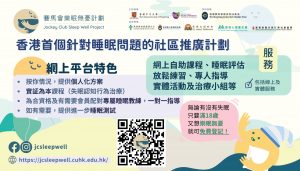Prevention of insomnia in at-risk youth: A randomized controlled trial comparing cognitive behavioral prevention program for insomnia with active control condition
Adolescence is a vulnerable period for the emergence of insomnia, which affects more than 10% of the youths (approximately 40% if based on symptoms). Insomnia in youths tends to run a protracted course and is associated with numerous negative outcomes including poor quality of life, cognitive and academic impairment, and predisposing to development of depression and anxiety. The burden arises from insomnia has been increasingly recognized worldwide as a debilitating and costly public health concern. However, insomnia in youths is often ignored and under-treated, with only 10% of the local youths recognized their insomnia problem and none of them has received the recommended first-line treatment – cognitive behavioral therapy for insomnia (CBT-I). Given the high prevalence, chronicity and long-lasting health-related consequences of insomnia, together with the delay and limited help-seeking behavior, it calls the urgent need for early insomnia prevention and intervention in this vulnerable population.
We aim to conduct a randomized controlled trial in comparing cognitive behavioral insomnia prevention program with the active control group in youths who are at risk of insomnia. The youth will be at 14-25 years old which will represent the most vulnerable period from middle adolescence to early adulthood for the emergence of insomnia. The results of this study will allow us to take this potential efficacious prevention program to scale and reduce the associated burden of insomnia in the future.
- Youth aged between 14-25 years
- Have subclinical insomnia symptoms (at least once a month but less than 3 times/week in the past one month; including difficulty in falling asleep, early morning awakening or difficulty maintaining sleep);
- At least one of the biological parents with current or lifetime history of insomnia disorder as defined by DSM-V diagnostic criteria.
Study content:
Youths with subclinical insomnia and positive insomnia family history will receive 4 weekly sessions of sleep or health education. Each session lasts around 45-60 minutes (6-8 people per group). After the intervention, they will be invited to attend four follow-up assessments at post-intervention, 3 month, 6 month and 12 month.
All sessions and assessments are free of charge and each participant will receive HK$100 travel allowance per visit to the hospital/study site for assessments. Participants who attend all the intervention sessions will additionally receive HKD$200.



